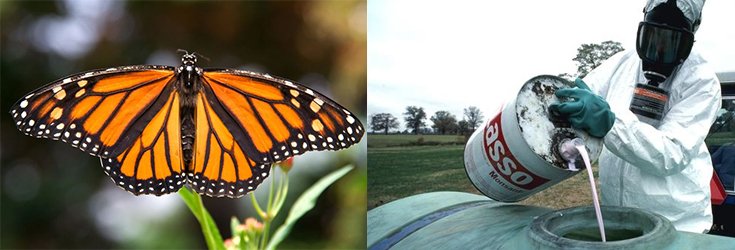Monsanto Donates Money to Save the Same Butterflies They’re Killing

The very company that scientists say has directly contributed to a 90% reduction in the monarch butterfly population is now donating to ‘help save the butterflies.’
Monsanto has announced a $4 million donation towards helping ‘fight’ for the monarch butterflies after numerous media organizations have highly publicized the reality that their best-selling herbicide Roundup has helped decimate the declining population (while destroying your health). The total collapse of the monarchs ultimately led to The Fish and Wildlife Service spending 2 million dollars just to help repair the damage.
Since around 1990, around 970 million butterflies have died off — amounting to a horrific 90% reduction. And it’s not a conspiracy that Monsanto takes on a large share of the blame.
Experts from around the world have been sounding the alarm since the very beginning. It was relatively recent that the true figures were becoming clear, with reports highlighting Monsanto’s direct role in the population meltdown.
“This report is a wake-up call. This iconic species is on the verge of extinction because of Monsanto’s Roundup Ready crop system,” the executive director for the Center for Food Safety, said Andrew Kimbrell, told RT.
Yet we continue to allow Monsanto to sell Roundup with zero boundaries, even after the latest World Health Organization report that classified the toxic herbicide as a substance that is likely to cause cancer.
This is a substance that has infiltrated the groundwater supply, our bodies, and especially our pantry thanks to its major use in mega agriculture. As a result of its toxicity, it now threatens monarchs (and bees) as a whole. And numerous monarch research groups are furious over the donation — an obvious PR attempt to escape ridicule over decimating the entire population.
#butterfly #science Monsanto giving $$ for the Monarch?… https://t.co/2Niuwv7V9C
— Butterfly Society VA (@Butterfly_VA) March 31, 2015
Based on research by the Center for Food Safety, around 99% of plants essential to monarch butterfly life have been destroyed thanks to Monsanto’s Roundup-based GMO corn and soybean crops that are prolific throughout the Midwest. These plants, known as milkweed, are the only place for monarchs to lay eggs as well as feed their larvae. In other words, the disappearance of milkweed thanks to Roundup is at the absolute center of the monarch collapse.
When will we finally take action against Monsanto’s Roundup?

that’s just like a large corp….Skip the reality and bring sugar cookies to the party.
Talk about Munchausen syndrome by proxy!!
Sounds like they’re buying the research to control what gets published as a result.
The EPA has issued a moratorium on use of a type of pesticide theorized to be responsible for plummeting bee populations. Neonicotinoids
are a class of common pesticides that recent research has pointed to as being harmful to birds, bees and other animals. The EPA previously approved their use, but outcry over the damage being done has caused the agency to reverse course while more studies are done. On Thursday, the EPA sent letters to people and companies that have appliedfor outdoor use of the pesticide, saying that new use permits won’t be issued.
New uses of neonicotinoids will no long be approved “until the data on pollinator health have been received and appropriate risk assessments completed,” the EPA letter reads.Existing permits to use them, however, will not be rescinded — something wildlife and environmental advocacy groups are unhappy with.